Federal unemployment benefits spur hiring crisis, poll shows
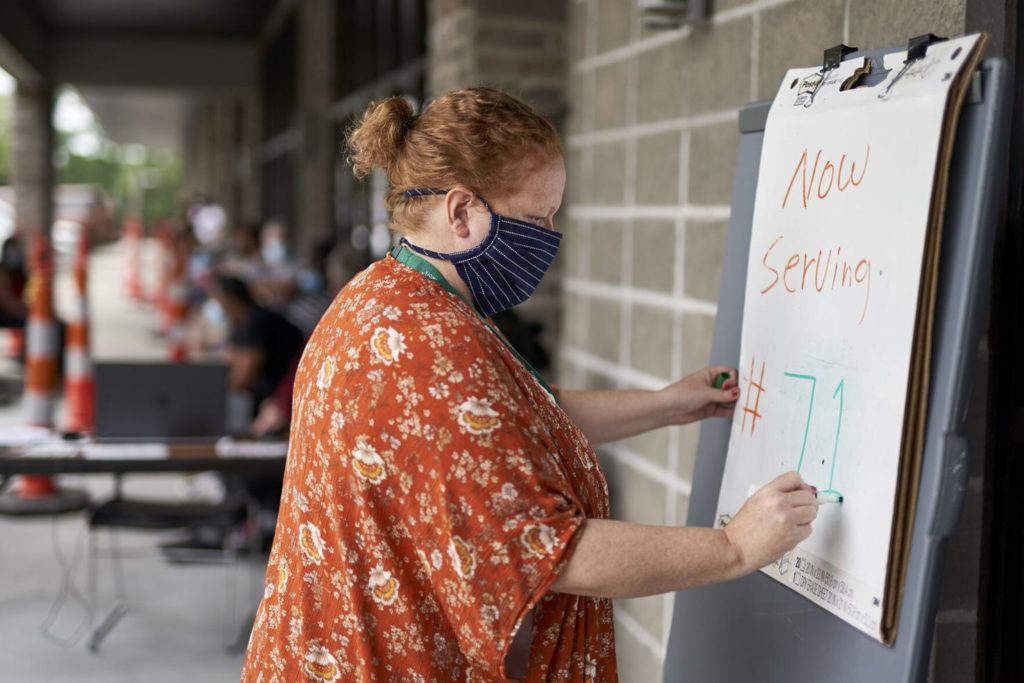
Republicans have argued for months that federal unemployment benefits are keeping Americans from going back to work, and a new survey seems to support that claim. The survey from Morning Consult released Wednesday found that 1.8 million Americans have turned down jobs even though they were unemployed, saying, “I receive enough unemployment benefits without having to work.” The payments in question came as part of the $1.9 trillion COVID relief bill passed earlier this year, which provided weekly $300 unemployment payments on top of state benefits. When business owners complained of the difficulty hiring workers and unemployment remained high despite widespread job availability, critics began to blame the federal benefits. The Morning Consult poll surveyed 5,000 adults in June. Of those polled who were collecting unemployment benefits, “29% said they turned down job offers during the pandemic. In response to a follow-up question, 45% of that group said they turned down jobs specifically because of the generosity of the benefits.” The poll numbers come after dozens of Republican-led states around the country have opted to reject the federal benefits, citing the concerns laid out in the poll. “Here we have solid confirmation that millions of people have remained unemployed because of the federal government’s reckless expansion of the welfare state,” wrote Brad Polumbo of the Foundation for Economic Education. “This is, on its face, even more vindication for the many conservative-leaning states that canceled the benefits early.” Polumbo points to a coming deadline that will likely be a point of debate. The federal benefits are set to expire in September of this year. The poll “offers even more compelling weight to the argument that the federal welfare expansion ought to be allowed to lapse in September as scheduled,” he said. “(There will undoubtedly be a push to extend it; the ‘temporary’ program has already been extended several times).” Some Senate Republicans have already begun the fight against renewing the benefits, with several introducing legislation to end the payments. The “Get Americans Back to Work Act,” introduced in May, would do just that. “Businesses throughout Florida have signs on their doors saying they are understaffed due to the ‘labor crisis,’” U.S. Sen. Marco Rubio, R-Fla., said. “The inability to find employees is a real problem, and small employers across our country are struggling to maintain their businesses. This legislation would help Americans get back to work and help our economy recover.” The senators have also pointed to the troubling economic indicators as signs that a change is needed. Foremost among those indicators is rising inflation. The Bureau of Labor Statistics released data this week showing the continued rise in inflation hitting levels not seen since the 2008 financial crisis. The U.S. Chamber of Commerce responded to that data, calling for it to be taken seriously. The group also called for an immediate end to the federal unemployment benefits. “A severe shortage of workers is causing employers to raise wages beyond the efficiency gains, which means the additional costs must be absorbed or passed along to customers,” the chamber said. “Rising wages are usually good, but in this case, they are at least partially the result of businesses competing with generous government benefits that provide some individuals with more money out-of-work than they earned working. In some cases, workers are on the sidelines because they do not have access to affordable childcare. Congress should act to end the extra $300 federal unemployment benefit immediately. States, as some already have, can end those payments unilaterally and use the funds to provide an incentive for workers to return, such as a return-to-work bonus and assistance with childcare costs.” By Casey Harper | The Center Square
Kay Ivey remains one of America’s most popular governor’s
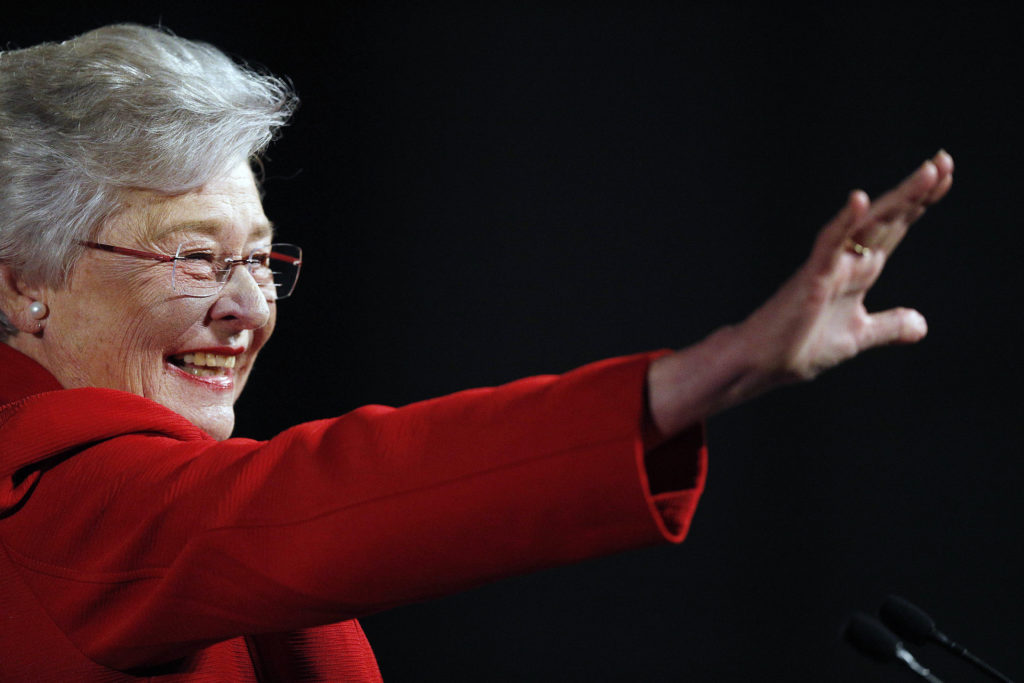
Gov. Kay Ivey has found herself in a position her political peers can only dream of: being one of America’s most popular governor’s during an election year. According to a new survey released Wednesday by Morning Consult, Ivey is America’s third most popular Governor and has a whopping 67 percent approval rating. Perhaps the first term governor’s — who assumed office last April after the resignation of her scandal-ridden predecessor former-Gov. Robert Bentley — high approval comes from the fact, under her leadership Alabama’s employment and wages are at the highest levels in over a decade, teachers and schools are finally receiving the funding and resources our children deserve, and the Governor continues to uphold conservative values. In June, Ivey handily defeated four GOP challengers in the Republican primary, garnering 56.1 percent of the vote. Her closest competitor was Huntsville Mayor Tommy Battle, who received only 24.9 percent. Ivey will face Tuscaloosa mayor and Democratic gubernatorial hopeful Walt Maddox in the general election on Nov. 6.
Survey reveals Kay Ivey is one of America’s most popular governors
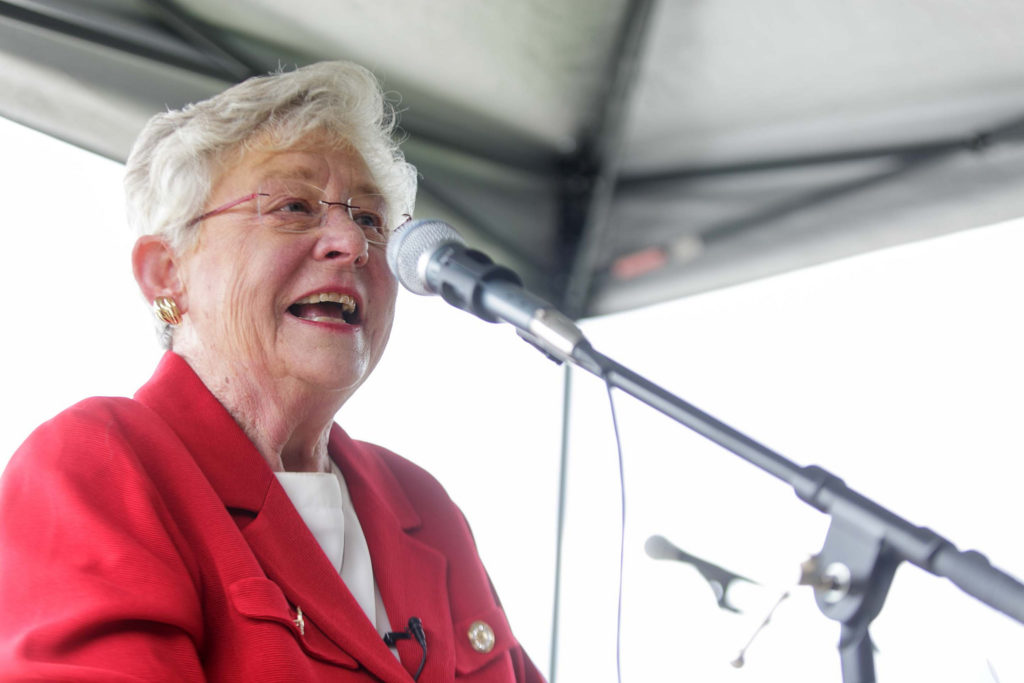
With a 67 percent approval rating among constituents Alabama Gov. Kay Ivey is now the third most popular governor in the country, according to the latest Morning Consult poll. The survey asked 275,000 registered voters in all 50 states to evaluate the job performance of their state’s chief executive from January 1 to March 31 of this year. Ivey’s no.3 spot remains unchanged from the fourth quarter of 2017. She also has a 52 percent net approval rating. For the fifth quarter in a row, America’s 10 most popular governors are all Republicans. The 10 most popular governors, according to the poll (in order): Massachusetts Gov. Charlie Baker Maryland Gov. Larry Hogan Alabama Gov. Kay Ivey Vermont Gov. Phil Scott New Hampshire Gov. Chris Sununu South Dakota Governor Dennis Daugaard Wyoming Governor Matt Mead Utah Governor Gary Herbert North Dakota Governor Doug Burgum Nevada Governor Brian Sandoval Oklahoma Gov. Mary Fallin, Illinois Gov. Bruce Rainer, New Mexico Gov. Susana Martinez, and Maine Gov. Paul Lepage make the list for the top five least popular governors.
Alabama gives Donald Trump his highest approval rating

A little over year after taking office, President Donald Trump national approval rating on the rise — up four percentage points since October. According to a Morning Consult survey released Tuesday, Trump now has a 44 percent approval and a 51 percent disapproval rating. Which isn’t saying a lot, but perhaps his attempt to turn a corner from the divisiveness of his first year in office is paying off in his approval numbers. While some states continue to be skeptical of the President’s policies, one place where Trump’s popularity continues to hold strong: Alabama. In the Heart of Dixie, the Commander in Chief maintains a +29 percent net approval rating, the highest of all states. In fact, in Alabama, his approval has gone up one percentage point, from 62 percent to 63 percent, from January 2018 to January 2018. The survey was based on 802,543 interviews of registered voters across each state and Washington, D.C., from Oct. 1, 2017 to Jan. 29, 2018. In each poll, Americans indicated whether they approve or disapprove of the job performance of Trump. For each question, they could answer strongly approve, somewhat approve, somewhat disapprove, strongly disapprove, or don’t know / no opinion. The results use a statistical technique called multilevel regression and poststratification (MRP) to estimate state-level public opinion from the national survey data.
Donald Trump popularity rising post-election, new poll shows

Since winning the presidential election, Donald Trump has become more popular with Americans, a new poll of registered voters shows. According to a survey conducted by POLITICO/Morning Consult Nov. 16-18, 45 percent of voters now have either a very favorable or somewhat favorable opinion of Trump. Twelve percent say they have a somewhat unfavorable opinion and 34 percent have a very unfavorable opinion of the president-elect. Anna Palmer of POLITICO calls it a “dramatic uptick” since the election Nov. 8. Trump’s favorability has jumped by 9 points, from 37 to 46 percent, compared to a similar Morning Consult poll taken just before the election. His unfavorability rating dropped 15 points, from 61 to 46 percent. In addition, less than one-third of respondents believe Trump’s children should play a role in his administration, and only one in four say certain Trump family members should be given security clearance. Voters are also supporting Trump’s call for a lobbying ban. Sixty-one percent of voters say they believe lobbyists should not serve in presidential administrations (Democrats by 55 percent; 67 percent of Republicans). Despite that, around four in 10 believe it is very or somewhat likely Trump will restrain the influence of lobbyists and special interests in his White House. President Barack Obama has also become slightly more popular, with 54 percent of voters approving his job performance; 43 percent disapprove. Before the election, 50 percent approved; 48 percent disapproved. “Trump’s favorability among voters has reached new highs since he became president-elect,” Morning Consult co-founder and Chief Research Officer Kyle Dropp told POLITICO in a statement. “This honeymoon phase in common for new presidents. For example, Obama saw about a 20-point swing in his favor following the 2008 election.” Trump’s transition also is being well received, as 19 percent of respondents believe it is better organized than previous efforts; 34 percent say his transition is about the same. Dropp notes “many of the initial transition picks, including Reince Priebus, Steve Bannon, and Jeff Sessions are still largely unknown to Americans.” The survey found more than half of respondents had never heard of, or had no opinion, on Priebus (Trump’s choice for chief of staff) chief strategist Bannon, or Alabama Sen. Sessions, his pick for attorney general. Nevertheless, about a third of voters called Priebus a “strong choice,” as opposed to 27 percent who say it was “weak.” Two in 10 feel Bannon was a strong choice; 34 percent called it weak. The POLITICO/Morning Consult poll contacted 1,885 registered voters, with a margin of error of plus or minus 2 percent. Thirty-three percent of those surveyed self-identify as Democrats, 32 percent independents, and 33 percent Republicans.
Robert Bentley is one of America’s least popular governors
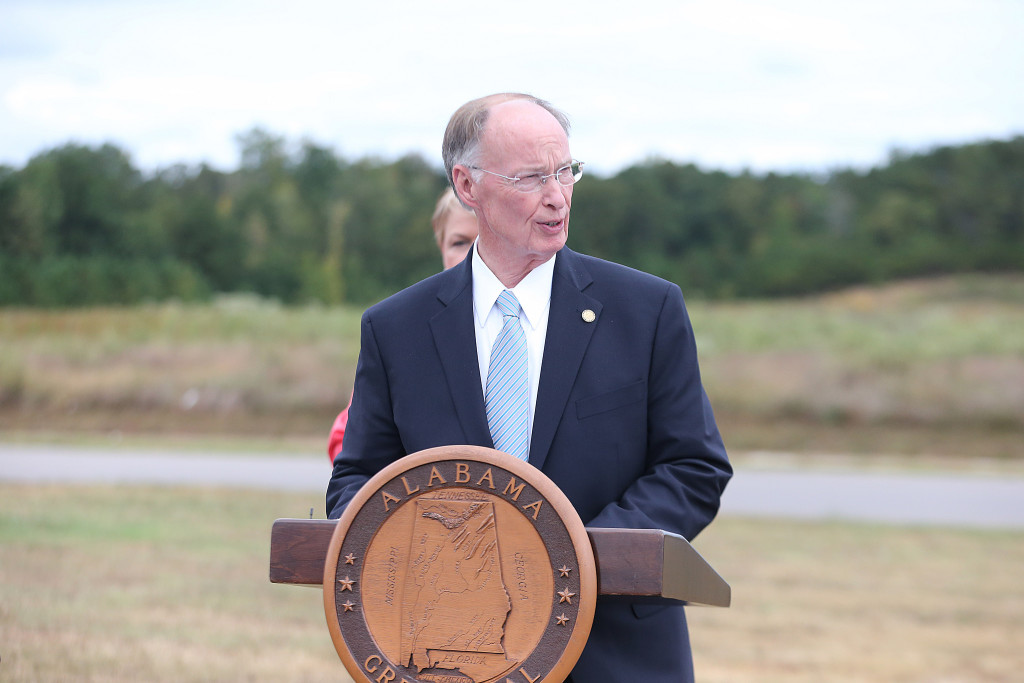
Robert Bentley can’t catch a break these days. The Alabama Governor is not only facing a continued call for his impeachment, but now he’s been ranked as one of the least popular governors in America. On Tuesday, media and research company, Morning Consult ranked America’s governors and Bentley ranked as the 8th least popular in the country. 53 percent of respondents said they disapproved of Bentley’s job performance. Only 35 percent said they approved of Bentley’s job performance, and 12 percent were undecided. Bentley’s new approvals ratings come in stark contrast from earlier in the year. He moved from a 1-point net approval rating among state residents to a whopping 18-point deficit between voters who have a favorable view of him (35 percent) and those who have an unfavorable view (53 percent). Bentley’s drop in favorability is almost certainly linked to his admission that he made inappropriate remarks to a former senior advisor Rebekah Mason. Before that scandal, from January through early May, his ratings were hovered around 46 percent approval and 45 percent disapproval. According to the Morning Consult here are the five most unpopular governors: Sam Brownback (R-Kan.) Dan Malloy (D-Conn.) Chris Christie (R-N.J.) Rick Snyder (R-Mich.) Paul LePage (R-Maine) According to the Morning Consult here are the five most popular governors: Dennis Daugaard (R-S.D.) Larry Hogan (R-Md.) Charlie Baker (R-Mass.) Steve Bullock (D-Mont.) Gary Herbert (R-Utah) The poll that tracked approval ratings of governors nationwide between May and early September, surveying more than 71,900 registered voters nationwide.
Survey: Robert Bentley’s approval ratings steady at 46 percent; 45 percent disapprove
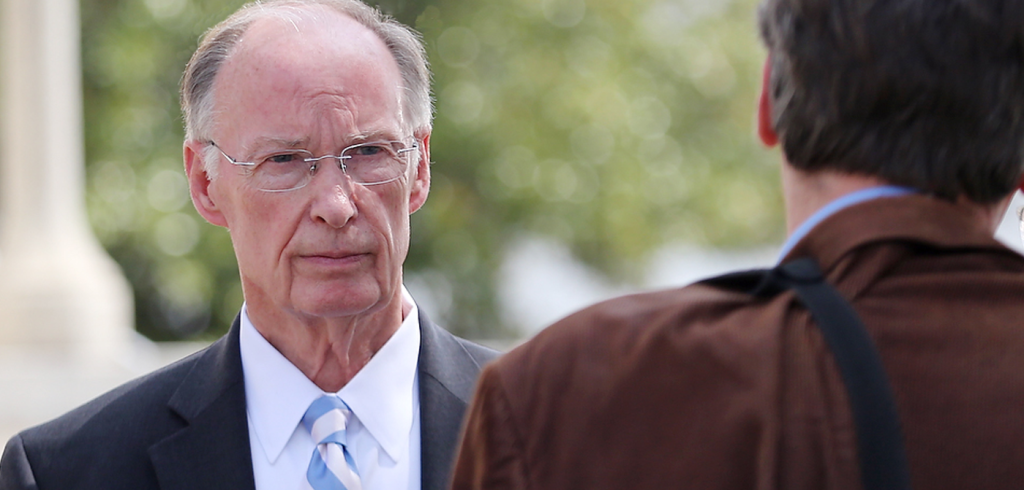
Embattled Gov. Robert Bentley may be political dead meat according to his most ardent foes in Montgomery, but a new poll out Thursday shows voters are split on the issue. Bentley’s approval rating, 46 percent, actually slightly surpassed his disapproval rating. 45 percent of Alabama voters, meanwhile, said they disapprove of the governor. The firm responsible for the new data, Morning Consult, speculated one reason voters’ opinions lagged behind conventional statehouse wisdom was that the allegations were that Bentley made “inappropriate” remarks to a former staffer and adviser only emerged recently. “In Bentley’s case, news about his possible impeachment is recent, which may explain why he has yet to be affected,” read a release from the group. News of the Bentley administration scandal broke in early April. Despite lumbering through an ongoing political scandal that has rocked Montgomery and let several high-ranking officials wondering aloud about impeachment proceedings, Bentley’s approval ratings are actually higher than several of his gubernatorial counterparts. Kansas Gov. Sam Brownback topped the list of opinion losers in the survey, with some 65 percent of respondents saying they disapprove of the governor. Critics of the Republican governor say his experiment in fiscal conservatism — including slashing taxes and social spending — have tanked the state’s economy. Number two on the list was Connecticut Democrat Gov. Dan Malloy, who has suffered due to discontent with his handling of the state budget and a weak state economy. 64 percent disapproved of his performance. Republican Michigan Gov. Rick Snyder rounded out the top three, the only other governor who topped a 60 percent disapproval rating, amid the infamous Flint, MI water crisis which has seen a national furor over deal poisoning in the city’s drinking water supply.
How popular are Alabama’s senators?
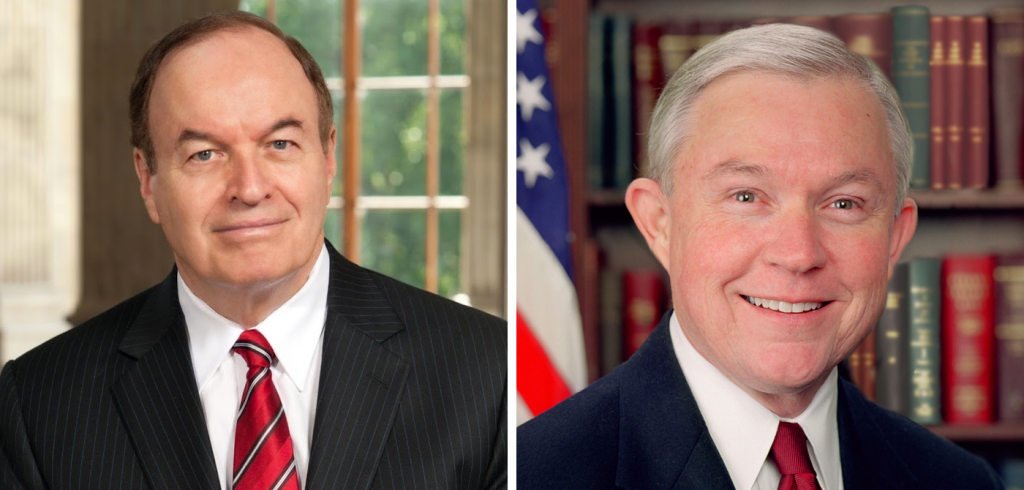
It’s no surprise, Congress’ public approval rating is abysmal — a vast majority of Americans continue to disapprove of the job they’re doing. According to Gallup polling the rating has been stuck in the mid-teens for over year, and has not exceeded 20 percent since October of 2012. Nevertheless some Americans actually really like particular members of Congress. A new survey by Morning Consult polled 62,000 registered voters in all 50 states as to what they thought about the job their senators are doing. The results: despite the overall Congressional approval rating, some senators rate highly in their home states among constituents. The top five most popular senators in America: Bernie Sanders (I-VT) Susan Collins (R-ME) John Hoeven (R-ND) Angus King (I-ME) Patrick Leahy (D-VT) The five least popular senators in America: Mitch McConnell (R-KY) Pat Roberts (R-KS) John McCain (R-AZ) Orrin Hatch (R-UT) Harry Reid (D-NV) As for Alabama’s senators, long-time Republican Senator Richard Shelby ranks as the 16th most liked senator with a 59% approval rating. Perhaps more surprisingly is that Tea Party darling Sen. Jeff Sessions is solidly in the middle of the pack ranked 33rd overall with a 54% approval rating.


